What the First World Cup Told Us About the Upcoming Olympics

American Natalia Grossman has been on a roll since winning every competition on the 2019 National Cup Series. Although she’s not an Olympian, fans should consider Grossman to be in the highest echelon of American competition climbers, and an eventual bronze medal at Meiringen underscored that. (Photo: Courtesy of IFSC’s Flickr page)
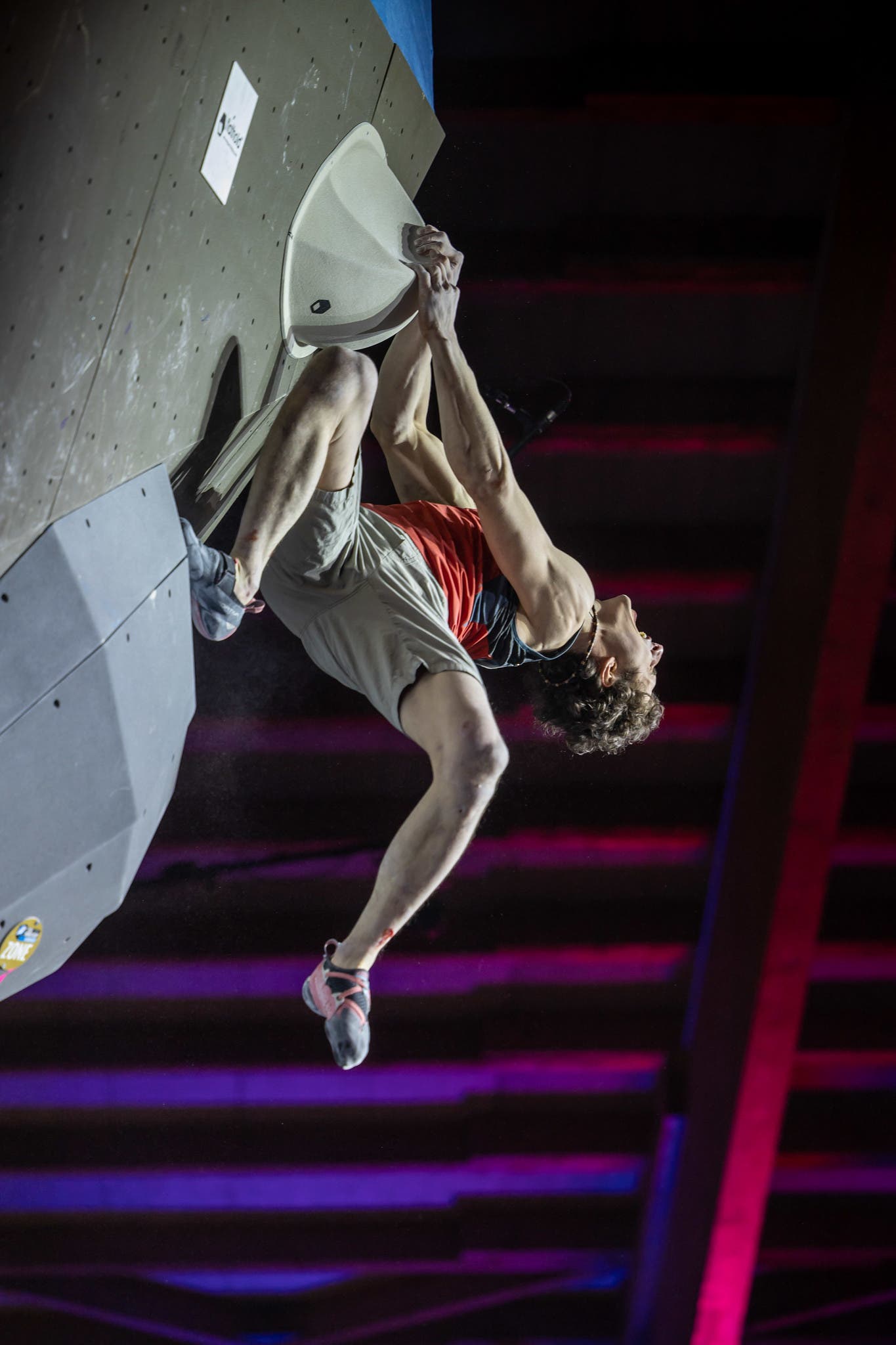
In recent years, the IFSC’s World Cup competition in Meiringen, Switzerland, has established itself as the most consistently memorable stop on the whole circuit. In 2018, Slovenian fan-favorite Jernej Kruder finally clenched a bouldering World Cup victory after a decade on the circuit. In 2019, the Meiringen event made a star out of Australia’s Oceana Mackenzie and reminded everyone that crack climbing is not exclusively for outdoor trad climbers and perfectly applicable on the competition scene. And because the COVID-19 pandemic forced the cancellation of all last year’s bouldering World Cup offerings, expectations were particularly high for the 2021 World Cup season kickoff at Meiringen.
Over the course of the two-day event, which was part of the Haslital Mountain Festival and concluded on April 17, fans were treated to extraordinary moments that have come to typify the annual competition—including familiar names on the circuit proving they are still in their prime, and young up-and-comers heralding an even more extraordinary future.
Garnbret is still amazing
Of all the veteran stars that took part at Meiringen, none shined brighter than Slovenia’s Janja Garnbret. In fact, Garnbret set the bar early by flashing all five boulders in her qualification group in the women’s division. A number of other competitors finished the round with five tops as well, including Japan’s Akiyo Noguchi, and the United States’ Natalia Grossman and Brooke Raboutou. But Garnbret’s lead heading into semifinals was an early indicator that her skills and dominance had not diminished amid competition climbing’s pandemic hiatus.
In the semi-finals, Garnbret continued to build on her lead and separate from the rest. She was the only competitor to top all the semi-finals’ boulders, including the second boulder of the round—a powerful, compression bloc that no one else ascended. The final round, too, saw Garnbret topping everything. Her ascent of the last boulder was a highlight of the event—not because Garnbret needed the top to win; her victory was already secure, with France’s 16-year-old phenom Oriane Bertone and Grossman rounding out the podium. But because of how casually and confidently Garnbret laughed off that boulder’s intended fist-jam beta (3:49:54 in the livestream), opted instead for a double-gaston, and cruised to the top. “She’s really the most talented, most successful climber that climbing has ever seen,” commentator Staša Gejo proclaimed about Garnbret, to which co-commentator Matt Groom aptly added, “A talent beyond anything we’ve seen.”
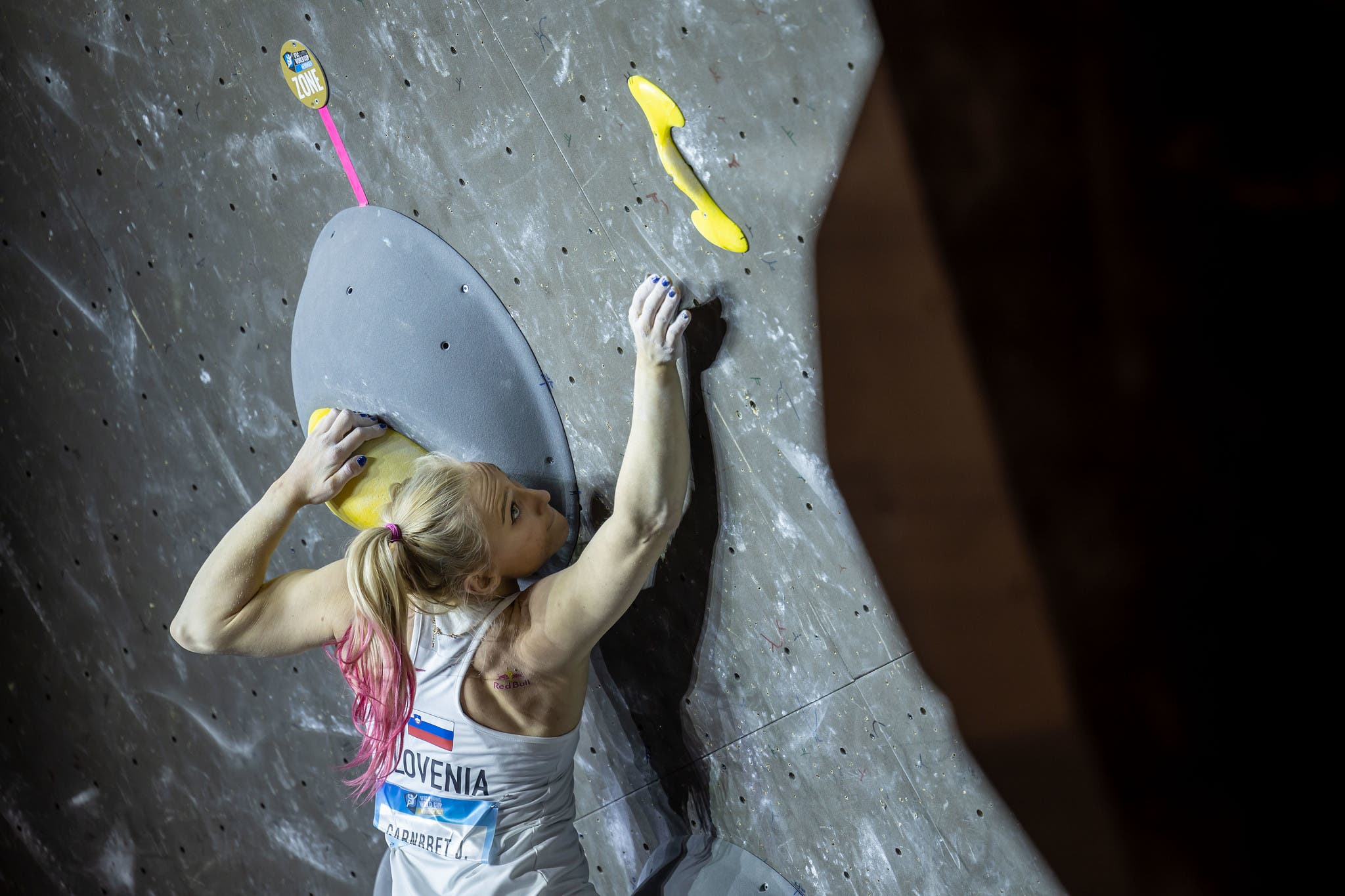
Groom’s effusive praise of Garnbret was fitting, particularly in Meiringen. The victory at this event added to the undefeated bouldering World Cup season that Garnbret amassed in 2019—along with a World Championships and an Olympic berth that same year. To put the accolades into linear perspective, Garnbret has won eight bouldering World Cup competitions in a row; she has not lost a bouldering World Cup competition since Vail, 2018.
Ondra grits it out
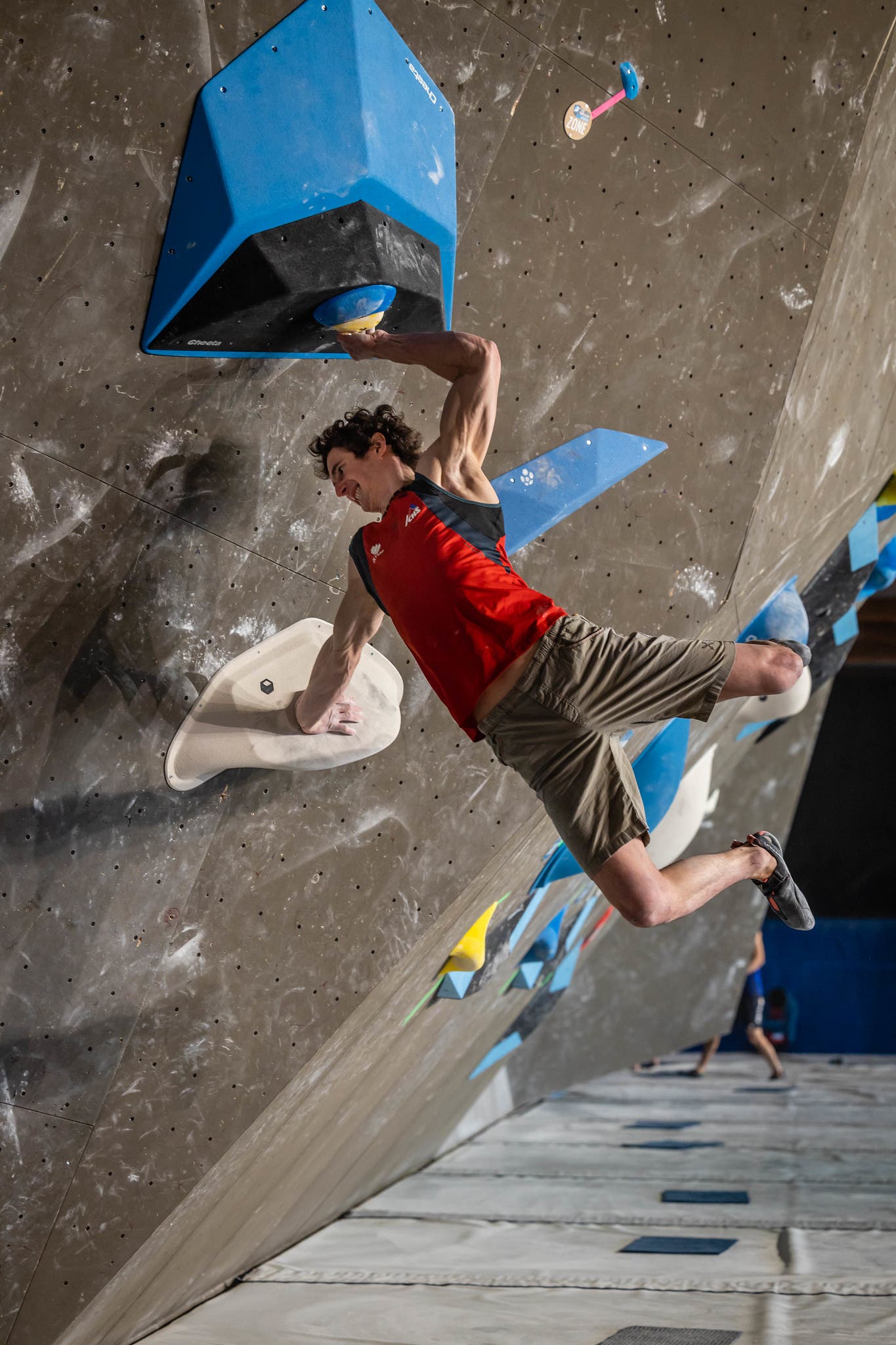
While the women’s division was an illustration of one competitor’s supreme talent, the men’s division featured several competitors vying for the lead and gaining only fleeting advantages throughout the rounds. The early leader in this melee was Japan’s Kokoro Fujii, who topped four of the qualification boulders to gain an early lead over the Czech Republic’s Adam Ondra—who also topped four qualification boulders. Ten competitors managed to top three boulders, including Slovenia’s Kruder, Germany’s Alex Megos, and the United States’ Nathaniel Coleman.
But as the event progressed, Kokoro Fujii’s early lead faded. Fujii struggled on the second boulder in the semi-finals and failed to secure the zone. Kruder, Megos, and others struggled on the boulder as well. As a result, Fujii fell to sixth place by the round’s completion, with Ondra topping three boulders to claim the top spot.
In the finals, Ondra and Japan’s Yoshiyuki Ogata traded tops on the first two boulders. A highly technical third boulder necessitated a toe-catch latched simultaneously with a deadpoint reach. It saw tops by Japan’s Tomoaki Takata (1:33:45 in the livestream)—along with Fujii, Ogata, and Ondra—and threw the scores into flux. As a result, the men’s division came down to the final boulder, a progression of low layback moves into a near-horizontal lunge. Ondra, climbing last, needed a successful ascent to win. His first attempt resulted in a fall midway up as his right foot slipped off a volume. He took a moment to compose himself on the mat, eased through the layback movements again—even used a subtle knee press and then a kneebar to ensure his foot would not slip again. Upon reaching the top and scoring the victory, Ondra gave a primal scream (2:03:42 in the livestream) that Matt Groom deemed “an explosion of all [the] tension” from the event.
Young crushers target the thrones
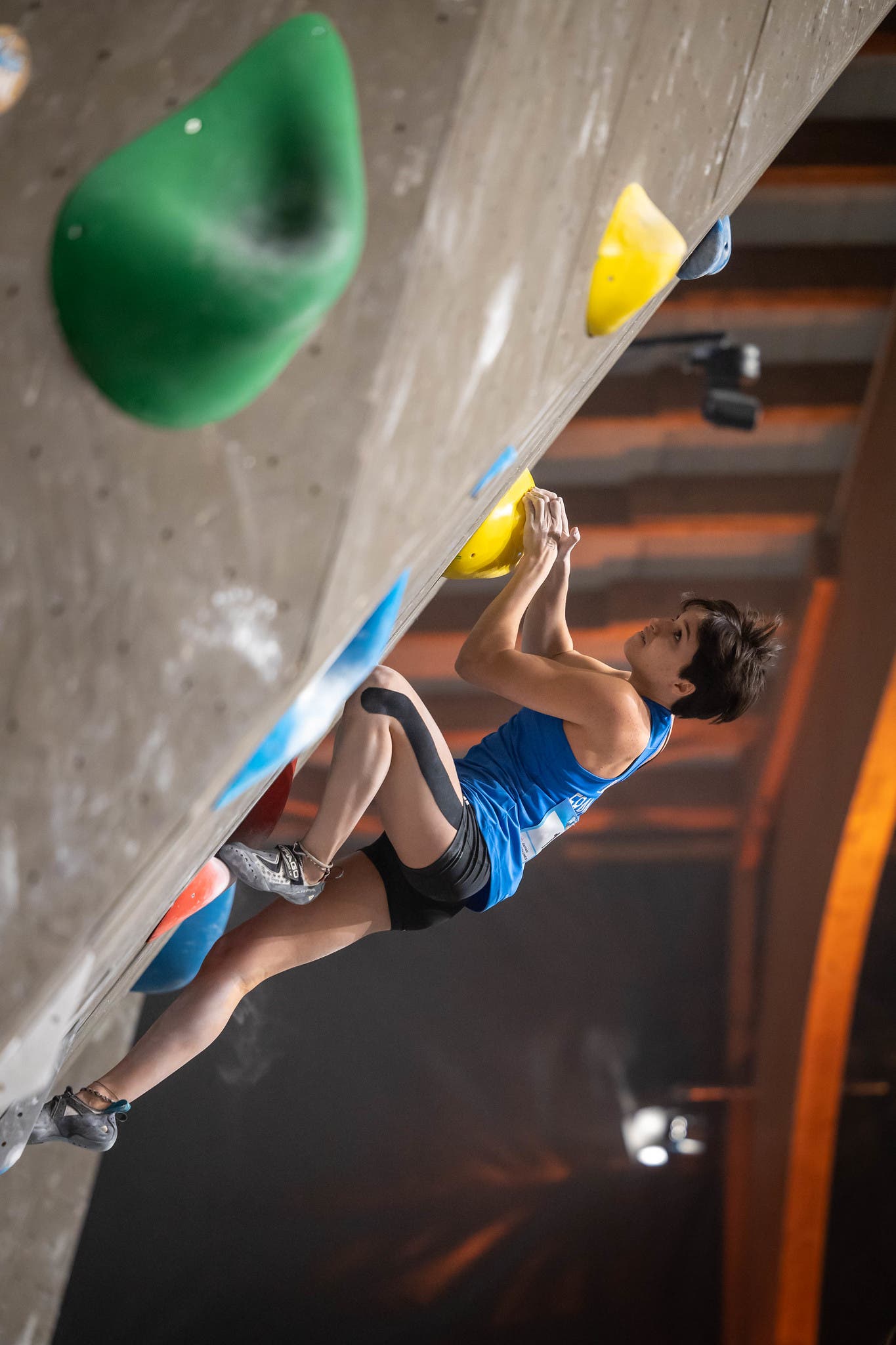
Even with thrilling victories by circuit veterans Ondra and Garnbret, the Meriginen World Cup event served as proof that we are in the midst of a generational shift on the adult competition circuit. No competitor made that shift feel more seismic than France’s Oriane Bertone. The fact that she, as a rookie, finished with a silver medal in the women’s division doesn’t fully encapsulate how good her weekend was. She was among those competitors who topped all five boulders in the qualification round; she actually finished semifinals with just one top less than Garnbret. And in the final round, she provided the most pulse-quickening moment as she reached the top of the third boulder right as the timing buzzer sounded. Only one other competitor—Garnbret—topped that particular boulder. So, if 16-year-old Bertone spent most of the event as the sole competitor in the figurative shadow of Garnbret, we are in for some excitement if/when Bertone someday comes out of that shadow and into the lights.
Likewise, the Meiringen World Cup should be considered a breakout international performance for the United States’ Natalia Grossman—who has already proved to be a star domestically, most notably with wins at the recent National Team Trials and USA Climbing’s 2019 Bouldering Nationals. Grossman is five years older than Bertone, and not an IFSC adult circuit rookie, so she was not showered with the same degree of hype. But solid scores throughout all rounds and a bronze medal make Grossman just as much a name to watch as the bouldering World Cup season progresses.
In fact, Team USA, on the whole, performed extremely well at Meiringen. Nathaniel Coleman advanced to the finals of the men’s division, and his fight through the scrunched press-position on the fourth boulder of the finals, which he topped, became something of a viral video in the immediate aftermath of the event. “He gave it all,” Staša Gejo declared on commentary, and it’s hard to find any recent competition climbing video clip that is as inspiring.
Lower in the men’s division, Sean Bailey placed 13th, Ross Fulkerson placed 16th; Colin Duffy tied for 31st, and Ben Hanna tied for 69th. In the women’s division, Brooke Raboutou placed 9th; Kyra Condie tied for 21st, barely missing out on a spot in the semi-finals; Kylie Cullen tied for 25th; and Campbell Sarinopoulos placed 52nd. With such depth to go with the appearances in finals by Coleman and Grossman, American fans should expect big things in the IFSC events to come in 2021.
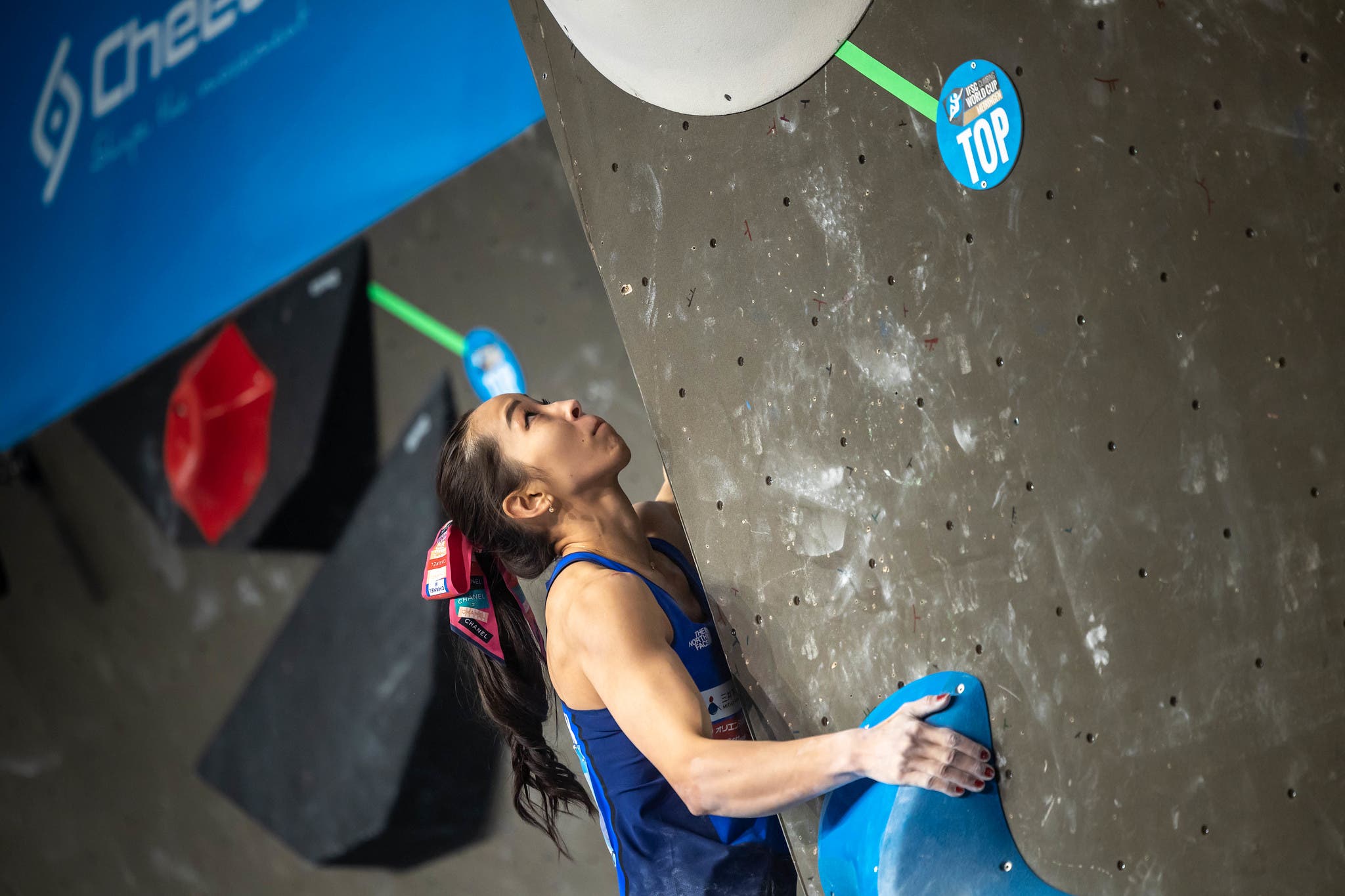
Results
Women
- Janja Garnbret (SLO)
- Oriane Bertone (FRA)
- Natalia Grossman (USA)
- Akiyo Noguchi (JPN)
- Vita Lukan (SLO)
- Katja Debevec (SLO)
Men
- Adam Ondra (CZE)
- Yoshiyuki Ogata (JPN)
- Tomoaki Takata (JPN)
- Kokoro Fujii (JPN)
- Nathaniel Coleman (USA)
- Sohta Amagasa (JPN)